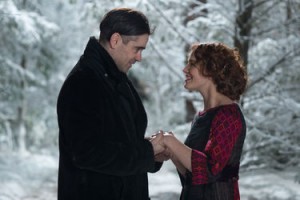
Based on the highly regarded novel of the same name by Mark Helprin, Winter’s Tale yearns to be a romantic fable for the ages. However, fans of the book are unlikely to be satisfied with this simplified adaptation and those unfamiliar with the story may end up more confused than beguiled.
The majority of the story takes place in New York City during the early part of the 20th century. Peter Lake (Colin Farrell) is a thief who has broken free from the control of a vicious gang leader named Pearly Soames (Russell Crowe). Determined to leave town before he is killed, Lake attempts to rob a house. Once inside, he encounters Beverly Penn (Jessica Brown Findlay), a terminally ill young woman. Of course, he immediately falls head over heels in love with her. It soon becomes clear that their lives are intertwined for greater, miracle-filled purposes. As more is revealed about the characters, we soon learn that the world is filled with demons, angels, a flying horse and other supernatural phenomena.
 Frankly, it’s difficult to explain the entirety of the convoluted plot. Suffice to say that this is an unabashedly romantic fantasy reminiscent of a fairy tale. And early on, there are some effective moments. A large magical horse plays a significant part in the proceedings. It’s an interesting and unusual relationship – Farrell amusingly converses with the silent animal and makes light of the situation with amusing quips. Crowe makes for a menacing and powerful villain, growling and committing murder whenever it suits him. There also seems to be a nice onscreen chemistry between Farrell and Findlay. It’s impressive that the charming cast are able to sell some of the outrageous material.
Frankly, it’s difficult to explain the entirety of the convoluted plot. Suffice to say that this is an unabashedly romantic fantasy reminiscent of a fairy tale. And early on, there are some effective moments. A large magical horse plays a significant part in the proceedings. It’s an interesting and unusual relationship – Farrell amusingly converses with the silent animal and makes light of the situation with amusing quips. Crowe makes for a menacing and powerful villain, growling and committing murder whenever it suits him. There also seems to be a nice onscreen chemistry between Farrell and Findlay. It’s impressive that the charming cast are able to sell some of the outrageous material.
Additionally, the photography is impressive. There are some effective shots emphasizing reflected light and how it connects everything and everyone. The theme of the film is admirable, stating that no one person is greater or better than anyone else and that we all have an important role in the universe. It’s certainly corny stuff, but early on these fantastic elements are employed in reasonably subtle manner. However, as the film progresses, it becomes clear that the vague concepts introduced aren’t going to be developed. And by the final third, subtlety is thrown out the window and the whole story train falls right off of the rails.
The final third of the movie takes us to modern day New York and the story slows to introduce new characters and reintroduce a few older ones. But while the beginning of the flick seemed to possess a dreamy, fairy tale charm, the later sections of the film lose that magic. The story doesn’t answer many of the questions it raises, including a big one left lingering after a final miracle (particularly as to what tangible trait a character possesses that makes them so special).
The movie also overemphasizes weak digital effects, showing horses fly over Times Square as well as characters being taken into outer space and morphing into stars. A subtle, suggestive approach to the supernatural would have been so much more effective. Further problems occur during the climax that pits the protagonist in a battle with the villain over the fate of a woman and child. As the two fight to the death, the woman doesn’t help or run to safety, and instead simply sits back and watches. Frankly, it all looks silly. Suspension of disbelief is quickly broken and the big, emotional climax doesn’t resonate.
Surely, the source material made far more sense. This adaptation misses crucial bits of information necessary to explain this fantasy world in more detail and engage viewers. Winter’s Tale was unlikely ever to live up to its source material, but the clumsy final act does little to salvage it even as an entertaining bit of romantic hokum.


